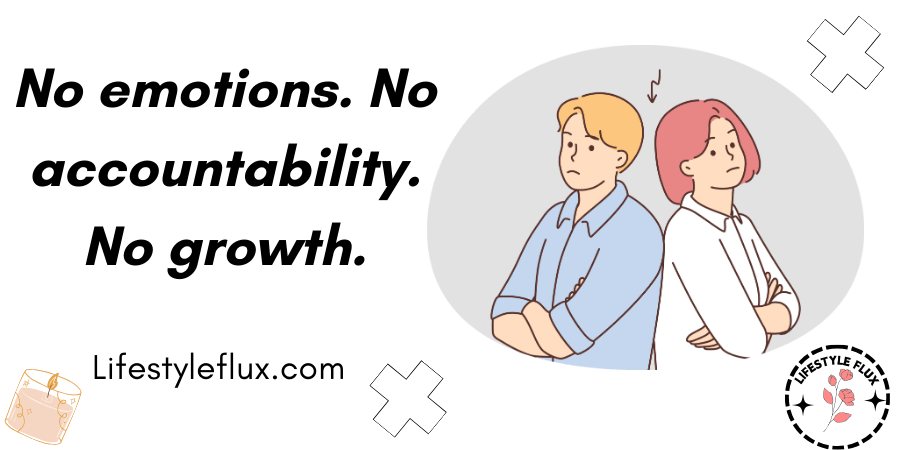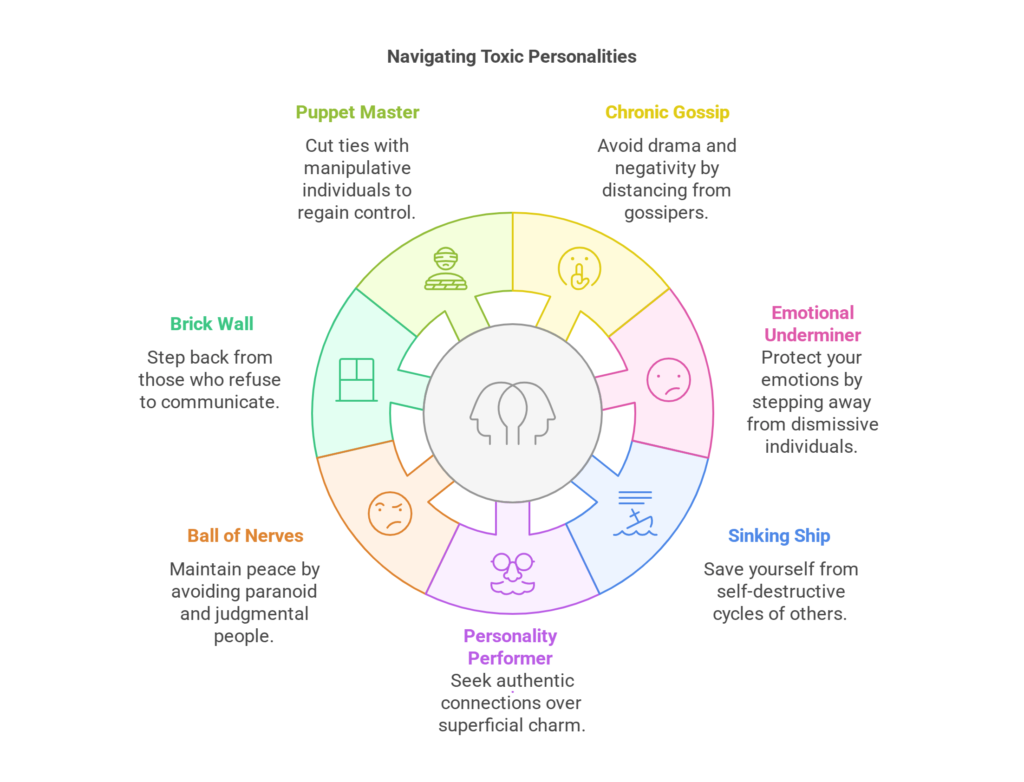We’ve all encountered people who leave us feeling drained, frustrated, or even questioning our own worth. Whether it’s the friend who thrives on drama or the partner who dismisses your emotions, toxic personalities have a way of sneaking into our lives and wreaking havoc.
In 7 Toxic Personality Types to Be Aware Of, we’ll explore the most common types of toxic individuals and how their behaviors can impact your mental and emotional well-being.
From the chronic gossip who thrives on others’ misfortunes to the manipulative puppet master who sees people as pawns, understanding these personalities is the first step to protecting yourself from their emotional toll.
Table of Contents
1. The Chronic Gossip
Everyone has a gossip lurking somewhere in their lives. Think about that friend who can’t stop stirring up conflict or the co-worker who’s constantly talking about other people’s personal lives.
A gossip is someone who deliberately tears you down but only behind your back. They’ll never say anything bad to your face. They’ll smile and pretend they’re your best friend and then talk trash about you moments after you leave the room.

But what’s in it for them? Well, for starters, they think it’s entertaining. Gossips usually don’t realize how much they’re hurting other people, but even if they do, they probably don’t care. Gossip is also a big ego booster.
Criticizing other people gives them power, and it gets people’s attention, which makes them feel special. Spending time with gossip is a great way to get hurt, so do yourself a huge favour and steer clear.
2. The Emotional Underminer
This might be the most irritating personality type on this list. For anyone who’s dealt with one firsthand, I’m sure you know exactly why. Imagine you just got home from a horrible day at work.
That morning, your co-worker messed up on a big project, but instead of fessing up to your boss, your co-worker sat back and let you take the heat. Because of them, you spent the entire afternoon getting yelled at. You thought you might even get fired, even though you had nothing to do with it.
Obviously, this is an incredibly frustrating situation. When you get home, you’re still feeling angry and helpless, so you call your partner to let off some steam. Think about what you expect from that phone call.
You’re looking for a little support. You’re hoping they’ll listen and make you feel heard. But halfway through your story, your partner cuts you off and says, “Oh, come on, you’re just being dramatic.”
Emotional underminers do this kind of thing all the time. They constantly brush you off and invalidate your feelings. It doesn’t matter how sad or frustrated you are; they act like your problems don’t matter. Now, I know it doesn’t sound that bad, but trust me, it’s a major issue in the long run.

Your partner isn’t just being negligent; they’re making you feel guilty for expressing yourself. Words like “dramatic,” “crazy,” and “oversensitive” trivialize your emotions, and it makes you feel foolish for having them.
These bad habits may be subtle, but they’re still extremely toxic because, in their mind, your feelings don’t carry any weight.
Emotional underminers don’t respect you or take you seriously. They might even think they’re better than you. Most underminers treat your emotional intelligence like a weakness.
Why? Because they struggle to express themselves or understand themselves. Since underminers can’t translate their own feelings into words, they make a habit of stepping on the people who can.
So, don’t spend another minute getting stepped on. Whether it’s your friend or your partner, get rid of the underminers in your life.
3. The Sinking Ship
Let’s say you’re sailing on the ocean when suddenly you run across a reef. The bottom of your boat gets torn apart, and you barely manage to stay afloat. Most people would try to fix their boat, right? But instead, you turn around and go through that reef a second time. And then, when that doesn’t sink you, you’d do it again.
That’s how this personality type lives. They act out the same destructive cycles and fall for the same traps, no matter how much it ruins their life. As a friend or partner, this is incredibly stressful to watch.
You know exactly what they’re doing wrong. Maybe you’ve told them a dozen times to stop, but it never works. The truth is, there’s only so much you can do. If they don’t want to change, it’s not worth sinking alongside them.
4. The Personality Performer
These people wear their personalities like masks. On the outside, performers seem polished and controlled. They might dazzle you with their charisma, flourish under the spotlight, or win the respect of everyone they meet.
But none of it’s for real—it’s all a performance. Performers embody the phrase “fake it until you make it.” To get what they want, they interact with the world using complicated, fake personalities.
Now, I say “personalities” (plural) because there’s usually more than one. Many performers have different masks prepared for every environment. One they wear to impress their friends, another they use to intimidate their co-workers.
You see, each mask is tailor-made for a specific kind of reaction: to grab people’s attention, to feel more powerful, or to blend into the crowd. Performers have no real problem treating their personality like a tool.
If they need to become a completely different person, well, they’ll do it without a second thought. But the biggest problem with this personality type isn’t their flexibility—it’s their complete lack of honesty with others and themselves.
Performers spend so much time manicuring their fake personalities that they rarely get in touch with their real emotions. So, most of them are extremely immature. If you manage to get a glimpse behind the curtain, you’ll find someone who’s selfish, childish, and almost always unhappy.
So, what went wrong? Performers don’t pay nearly enough attention to their interior selves. They’re out of touch with their genuine wants, needs, and goals.
It takes a lot of time to develop enough confidence to share your interior self with the world, but performers never do. Instead, they’re scared of letting down their walls. To a performer, nothing is more terrifying than being vulnerable.
Some people become performers because they’re worried about getting hurt. They use their fake personality like a shield to protect them from danger. Others perform because they’re deeply unsatisfied with their real personalities. Each mask is an opportunity to be someone else—someone they actually like.
If it wasn’t obvious enough already, trust is something you’ll never have with a performer. Bonding is almost impossible because you’re not interacting with their interior selves. You’re just talking to a mask.
5. The Ball of Nerves
Have you ever met someone who’s constantly paranoid? No matter what they’re doing, they always think someone’s out to get them. If they fail a test, it’s because their teacher hates them. If they get fired from their job, they insist that their co-workers are conspiring against them.
These people don’t think anything is their fault. Instead, they’ll find a thousand reasons why it’s somebody else’s. To make matters worse, this personality type is really judgmental.
They’re not fun people to be around because, in their eyes, you can never do anything right. They’ll insult you, they’ll try to control you, and they’ll never forgive you for making a mistake.
So, save yourself from the grudges and pointless paranoia. If you run into a ball of nerves, don’t bother getting involved.
6. The Brick Wall
Have you ever heard the expression, “It’s like talking to a brick wall”? Well, that’s what you get with this personality type. They’re terrible communicators, and they’re notoriously distant. But that’s not why they’re toxic.
You might have friends who are reserved and aloof, but they may find other ways to communicate and strengthen your friendship.

The real problems start when a brick wall runs away. Instead of working through their problems, they completely avoid them. You might notice a brick wall pretending that their obvious issues don’t exist. But they do, and someone’s got to take care of them. Unfortunately, that someone usually turns out to be you.
The worst part is you can’t even confront them about it. Brickwalls hate hearing about their failures. If you tell them that they’re in denial, there’s a good chance they’ll lash out. Now, I know on the surface, it looks like brick walls don’t have any emotions, but they do.
They have a lot of pent-up frustration, and over time, it can cause them—and you—a lot of unnecessary stress.
Many brick walls become bitter, resentful people because they’ve been holding on to the same unresolved issues for their entire lives. Now, of course, it’s not your job to solve their problems for them. If you know someone who acts like a brick wall, it may be time to take a step back.
7. The Puppet Master
Finally, let’s talk about the most extreme of our seven personalities. Puppet masters have little to no empathy. They treat manipulation like a sport, and they only care about their own satisfaction. If it sounds like I’m describing a psychopath, that’s because I am. Many puppet masters fit well with clinical definitions of psychopathy.
They’re usually narcissistic and tend to be uncomfortably aggressive. Most importantly, they’ve got this unique combination of high self-worth and a fragile ego.

They think they deserve more than anyone, that they’re destined for some power or prestige. And unfortunately, that self-obsession can lead them down a very dark road.
Not all puppet masters are psychopaths, but you should still keep your distance. Puppet masters have no problem taking advantage of other people—even their friends and family. They develop these parasitic relationships, which lets them benefit from all your hard work.
Since they’re lacking in the empathy department, this doesn’t sound like a problem to them. But it is a problem for you. If someone is intentionally using you, it’s time to make a change.
Conclusion:
Toxic personalities are like weeds in a garden—if left unchecked, they can overrun everything and choke out the good. Recognizing these behaviors in others is crucial, but it’s equally important to set boundaries and prioritize your own well-being.
Whether it’s cutting ties with a chronic gossip or stepping back from a manipulative puppet master, you have the power to reclaim your emotional space.
Remember, you deserve relationships that uplift and support you, not ones that leave you feeling drained or undervalued. By identifying and distancing yourself from these toxic traits, you’re not just avoiding the emotional drain—you’re creating room for healthier, more fulfilling connections in your life.

Sources:
https://www.psychologytoday.com/intl/blog/how-to-do-life/201410/dangerous-personalities
https://www.inc.com/jessica-stillman/8-types-of-toxic-people-you-should-always-avoid.html
https://www.hbs.edu/ris/Publication%20Files/16-057_d45c0b4f-fa19-49de-8f1b-4b12fe054fea.pdf
https://www.psychologytoday.com/us/blog/in-flux/201608/8-common-traits-of-toxic-people

Founder and CEO of Lifestyleflux.com, I bring years of expertise in self-improvement, wellness, and personal development to help you lead a happier, more balanced life. Through practical insights, eBooks, and consultations, I share actionable strategies rooted in experience and a passion for empowering others to unlock their full potential.

